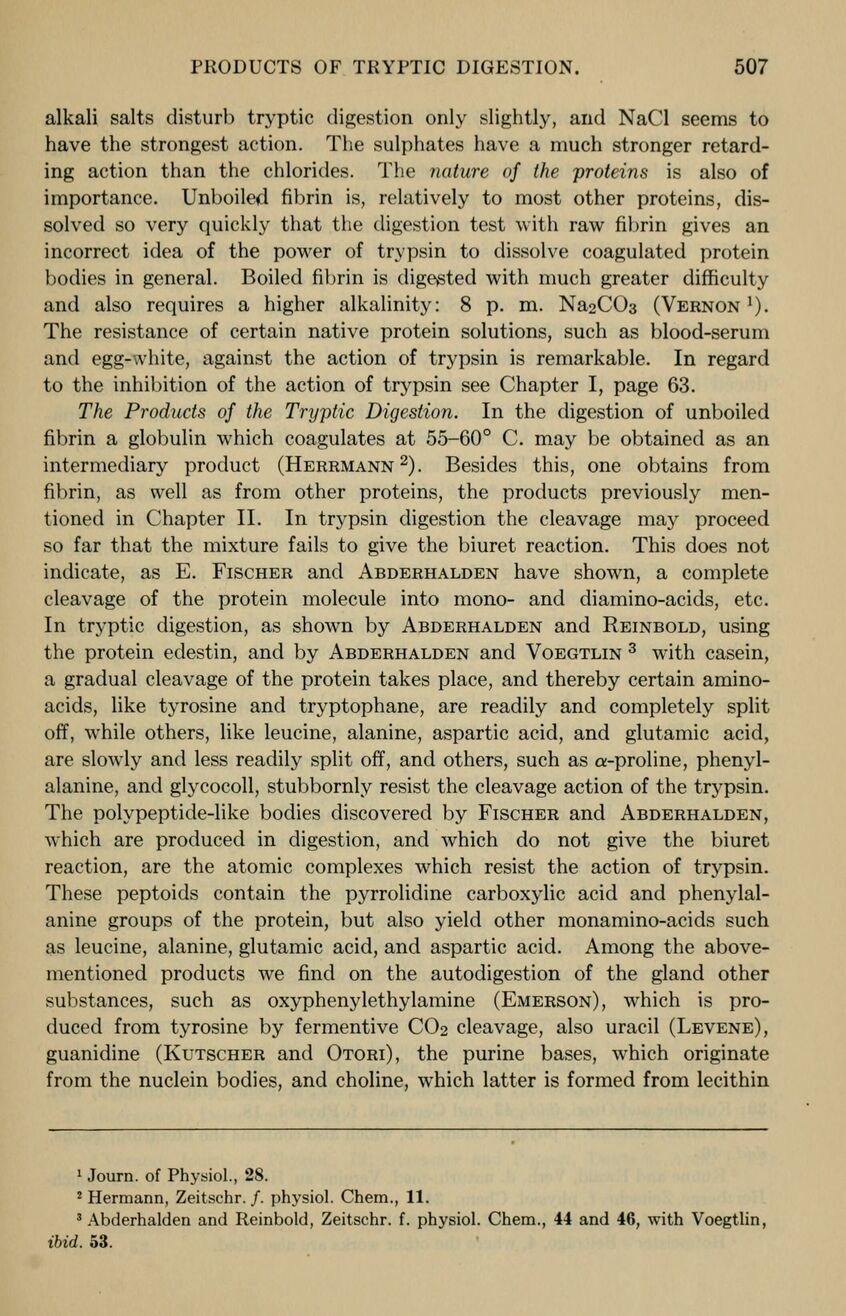
Full resolution (JPEG) - On this page / på denna sida - VIII. Digestion - IV. The Pancreas and Pancreatic Juice

<< prev. page << föreg. sida << >> nästa sida >> next page >>
Below is the raw OCR text
from the above scanned image.
Do you see an error? Proofread the page now!
Här nedan syns maskintolkade texten från faksimilbilden ovan.
Ser du något fel? Korrekturläs sidan nu!
This page has never been proofread. / Denna sida har aldrig korrekturlästs.
PRODUCTS OF TRYPTIC DIGESTION. 507
alkali salts disturb tryptic digestion only slightly, and NaCl seems to
have the strongest action. The sulphates have a much stronger retard-
ing action than the chlorides. The nature of the proteins is also of
importance. Unboiled fibrin is, relatively to most other proteins, dis-
solved so very quickly that the digestion test with raw fibrin gives an
incorrect idea of the power of trypsin to dissolve coagulated protein
bodies in general. Boiled fibrin is digested with much greater difficulty
and also requires a higher alkalinity: 8 p. m. Na2C03 (Vernon 1
).
The resistance of certain native protein solutions, such as blood-serum
and egg-white, against the action of trypsin is remarkable. In regard
to the inhibition of the action of trypsin see Chapter I, page 63.
The Products of the Tryptic Digestion. In the digestion of unboiled
fibrin a globulin which coagulates at 55-60° C. may be obtained as an
intermediary product (Herrmann 2
). Besides this, one obtains from
fibrin, as well as from other proteins, the products previously men-
tioned in Chapter II. In trypsin digestion the cleavage may proceed
so far that the mixture fails to give the biuret reaction. This does not
indicate, as E. Fischer and Abderhalden have shown, a complete
cleavage of the protein molecule into mono- and diamino-acids, etc.
In tryptic digestion, as shown by Abderhalden and Reinbold, using
the protein edestin, and by Abderhalden and Voegtlin 3
with casein,
a gradual cleavage of the protein takes place, and thereby certain amino-
acids, like tyrosine and tryptophane, are readily and completely split
off, while others, like leucine, alanine, aspartic acid, and glutamic acid,
are slowly and less readily split off, and others, such as a-proline, phenyl-
alanine, and glycocoll, stubbornly resist the cleavage action of the trypsin.
The polypeptide-like bodies discovered by Fischer and Abderhalden,
which are produced in digestion, and which do not give the biuret
reaction, are the atomic complexes which resist the action of trypsin.
These peptoids contain the pyrrolidine carboxylic acid and phenylal-
anine groups of the protein, but also yield other monamino-acids such
as leucine, alanine, glutamic acid, and aspartic acid. Among the above-
mentioned products we find on the autodigestion of the gland other
substances, such as oxyphenylethylamine (Emerson), which is pro-
duced from tyrosine by fermentive CO2 cleavage, also uracil (Levene),
guanidine (Kutscher and Otori), the purine bases, which originate
from the nuclein bodies, and choline, which latter is formed from lecithin
1
Journ. of Physiol., 28.
2
Hermann, Zeitschr. /. physiol. Chem., 11.
3
Abderhalden and Reinbold, Zeitschr. f. physiol. Chem., 44 and 46, with Voegtlin,
ibid. 53.
<< prev. page << föreg. sida << >> nästa sida >> next page >>